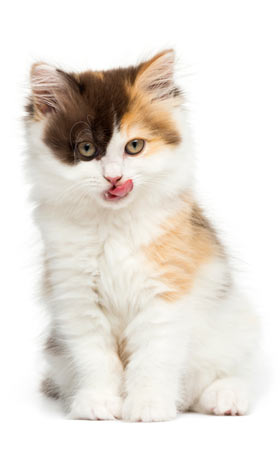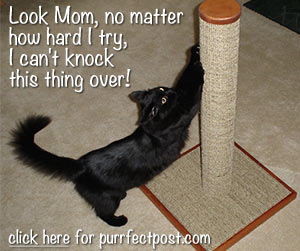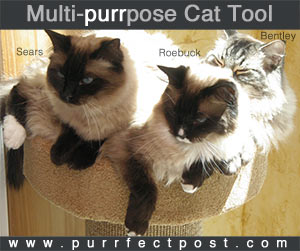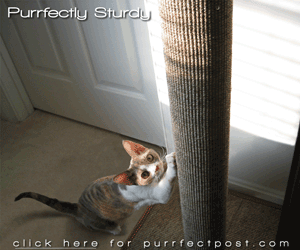Foods Toxic to Cats - Slideshow

Foods That Are Toxic to Cats
Many of us are used to slipping our cats some "people food" from our plates every day. It's best to remember that cats aren't the same as humans, though, and some foods that are perfectly safe for us can have potentially devastating effects on them. Following, we list some of the foods you should never give your cat. Many of them may surprise you.

Tuna
It's no secret: cats love tuna. Feeding your cat small amounts of canned tuna as a treat is OK but a steady tuna diet is not. Feeding large amounts of canned fish to cats has been associated with the development of a deadly oral cancer called squamous cell carcinoma. Too much tuna and not enough cat food also results in malnutrition, as tuna prepared for humans does not contain all of the proper nutrients to keep your cat healthy.
Too much tuna can also lead to mercury poisoning. Another condition seen when cats are fed an overabundance of canned, oily fish like tuna is steatitis. Known as "yellow fat disease," steatitis can have a few causes but the most common is a diet high in unsaturated fatty acids but deficient in protective antioxidants like Vitamin E. The disease produces fever, abdominal pain, lumps under the skin in the fatty tissue, inappetance, and pain during movement.

Onion, garlic, and chives
Any form of onion (including raw, cooked, and powdered) and garlic and chives can all cause GI upset in a cat. Of even more concern, they can damage your cat's red blood cells. Damaged red blood cells results in anemia and all of the problems that come with it, including weakness, lethargy, and collapse.

Dairy/milk
It may surprise you to find out that most adult cats are lactose intolerant. A small treat of dairy occasionally won't likely be a problem, but too much can cause GI upset and lots of diarrhea.

Alcohol
This is one case where your cat's body doesn't process the food any differently than yours does. Alcohol affects the brain and liver of a cat just like it does in humans. However, cats being so much smaller than we are, it does not take very much alcohol to cause permanent damage and death.

Raw bread dough
Be sure to keep rising bread dough out of reach of your cat. Doughs that contain live yeast, when eaten by your cat, continues to rise in the warm, moist environment of the stomach. This can stretch the stomach walls beyond their capacity, interfering with the blood supply and causing pain. Secondly, alcohol is produced secondary to the consumption of sugar by the yeast. This can result in alcohol toxicity when the dough is ingested by your cat.

Grapes and raisins
It isn't understood exactly why, but grapes and raisins have the potential to cause kidney failure and death in dogs. There have been reports of grapes and raisins affecting cats as well, so it's best to keep them out of reach of your cat.

Caffeine
There is caffeine in a large array of human products and it is toxic when ingested by cats. Coffee, coffee grounds, tea bags, and diet pills are some common ways that cats eat caffeine. It can cause an increased heart rate, agitation, high blood pressure, seizures, and death.

Chocolate
Most cats won't try chocolate on their own but sometimes they are enticed to eat it by well-meaning owners. Chocolate contains caffeine and theobromine, both members of the methylxanthine family of compounds that stimulate a cat's cardio and neuro systems. Chocolate can cause agitation, seizures, and death. Small amounts can cause pancreatitis, a painful and dangerous condition. Certain types of chocolate contain more toxic compounds than others and dark baker's chocolate contains the most.

Fat trimmings
Cats don't metabolize fats the same way humans do, and they can cause GI upset, diarrhea and, more seriously, pancreatitis.

Bones
Giving your cat bones from your dinner or meat with bones is dangerous because they can cause choking or tooth and gum injury. They can splinter and puncture the intestine, resulting in a very dangerous septic abdomen. They can also get stuck in the intestine, resulting in an obstruction that will require surgery to relieve.

Raw eggs
Raw eggs present the same dangers to your cat as to you: bacterial infections such as Salmonella and E-coli. Your cat is not resistant to these bacteria and they can result in serious illness. Even if your cat does not contract a dangerous bacteria, raw eggs can cause trouble. Avidin, a protein in raw egg whites, blocks your cat's body from absorbing the B vitamin biotin. This can result in skin and coat problems for your cat.

Raw meat and fish
These foods also present the risk of bacterial infection to your cat. Additionally, they contain thiaminase enzymes. These break down thiamine, a B vitamin that your cat's body needs. The results are neurological problems including seizures and coma.

Dog food
When you have both dogs and cats in your home, it isn't unusual for them to nibble on each other's food now and then and that won't cause a problem for either of them. However, if you feed your cat only dog food, they will be malnourished. Dog food does not contain the correct levels of protein or fat for your cat and a prolonged diet of it will make them sick.

Liver
Small amounts of liver are OK for your cat but too much will result in Vitamin A toxicity. This can affect your cat's bones; resulting in growths on the bones, osteoporosis, and even death.

Medication
Prescription human medications can be very dangerous and even deadly for your cat. Keep your medications locked away from your cat's reach. Many over-the-counter medications are also very dangerous for cats. Drugs that may seem harmless like Tylenol, Ibuprofen, and Aspirin can all cause death in cats. If your cat has a problem that you think might require medication, call your veterinarian for advice.

Vegetarian diet
Some people who are vegetarians want to feed their cats that way too. Unfortunately, cats are obligate carnivores: they MUST have meat. A vegetarian diet will result in nutritional deficiencies and their associated disease processes in your cat.

Inappropriate life stage diet
Commercial cat food diets are often staged to fit a certain life stage and giving the wrong one can be detrimental. A senior cat needs different protein and fat levels than a kitten. A kitten that is fed a diet for a senior or a prescription diet for your other cat with kidney problems may not develop properly due to the lack of proper nutrition for growing. Follow your veterinarian's recommendations when choosing a life stage diet for your cat.

Too many treats
Some cats love treats and we love to give them. But too many can be a problem. It may decrease your cat's appetite for regular cat food, resulting in dietary insufficiencies. It may cause obesity and even diabetes. Try breaking up a couple of treats into multiple pieces in the morning and making them last all day.

A Few Dangerous Non-food Household Items:
Plants
Most plants, if eaten in large amounts by cats, can cause GI irritation and vomiting. Some are toxic and can cause kidney, liver, and neurological damage. If you have houseplants, look them up on a toxic plant list before allowing your cat access to them. If you have a cat that loves to nibble on plants, providing cat grass and catnip plants that are safe for cats to eat can help keep them satisfied and away from your other plants.

A Few Dangerous Non-food Household Items:
Strings
Strings and ribbons of all kinds are dangerous when ingested by cats. They are also irresistible to many of our feline friends. Strings that have been involved in food preparation, such as to truss turkeys or chickens can be especially enticing. Strings are notorious for causing serious problems in the feline digestive tract. They can catch around the base of the tongue or anywhere in the GI tract, causing the intestine to intussuscept, or slide within itself. This condition will require surgery.

A Few Dangerous Non-food Household Items:
Tobacco and Marijuana
Tobacco is toxic when ingested by cats and is present in cigarettes, cigars, nicotine gum, and other sources. Tobacco initially stimulates the nervous system, potentially causing excitability, tremors, and seizures. At higher doses, it can cause depression, paralysis, and death. Marijuana can affect cats when they are exposed to secondhand smoke or when they ingest it or baked goods containing it. The compound THC in marijuana causes depression of the neurologic, cardiac, and respiratory systems and can cause seizures, coma, and death.

What to Do if Your Cat Eats Something It Shouldn't:
If your cat eats a food, medication, or plant that you know is unsafe or one that you aren't sure of, call your veterinarian or the Pet Poison Helpline right away and follow their instructions.







